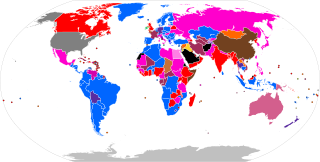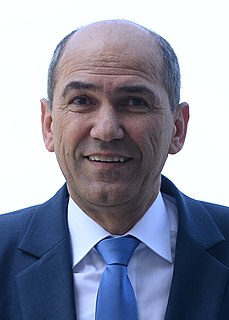Open list describes any variant of party-list proportional representation where voters have at least some influence on the order in which a party's candidates are elected. This as opposed to closed list, which allows only active members, party officials, or consultants to determine the order of its candidates and gives the general voter no influence at all on the position of the candidates placed on the party list. Additionally, an open list system allows voters to select individuals rather than parties. Different systems give voter different amounts of influence. Voter's choice is usually called preference vote.
Regular elections in Croatia are mandated by the Constitution and legislation enacted by Parliament. The presidency, Parliament, county prefects and assemblies, city and town mayors, and city and municipal councils are all elective offices. Since 1990, five presidential elections have been held. During the same period, nine parliamentary elections were also held. In addition, there were six nationwide local elections. Croatia has held two elections to elect 11 members of the European Parliament following its accession to the EU on 1 July 2013.

Elections in Angola take place within the framework of a multi-party democracy and a presidential system. The National Assembly is directly elected by voters, whilst the leader of the largest party or coalition in the National Assembly automatically becomes President. The country is currently a one-party dominant state, with the MPLA as the dominant party.

Elections in Barbados is the process of conducting general elections or by-elections and formulating election results in Barbados. An election is a process in which a vote is held to democratically elect national candidates to an office. In the case of Barbados, it is the mechanism by which the electors choose members to fill elective offices in the House of Assembly. Elections are held on Election Day. These general elections do not have fixed dates, but must be called within five years of the opening of parliament following the last election. A former minister of the DLP, Warwick Franklin summed up the general elections process in Barbados as saying it is really just, "30 by-elections on the same day."

Elections in Benin take place within the framework of a multi-party democracy and a presidential system. Both the President and the National Assembly are directly elected by voters, with elections organised by the Autonomous National Electoral Commission (CENA).

Elections in Botswana take place within the framework of a multi-party democracy and a parliamentary system. The National Assembly is mostly directly elected, and in turn elects the President and some of its own members. The Ntlo ya Dikgosi is a mixture of appointed, hereditary and indirectly elected members.

Elections in Guinea-Bissau take place within the framework of a multi-party democracy and a semi-presidential system. Both the President and the National People's Assembly are directly elected by voters.

Elections in Kenya take place within the framework of a multi-party democracy and a presidential system. The President, Senate and National Assembly are directly elected by voters, with elections organised by the Independent Electoral and Boundaries Commission (IEBC).

Elections in Cuba involve nomination of municipal candidates by voters in nomination assemblies, nomination of provincial and national candidates by candidacy commissions, voting by secret ballot, and recall elections. Cuba is a one-party state with the Communist Party of Cuba as the "leading force of society and of the state" under the national constitution, although elections are nominally non-partisan.
Elections in Hungary are held at two levels: general elections to elect the members of the National Assembly and local elections to elect local authorities. European Parliament elections are also held every 5 years.

Elections in Lithuania gives information on elections and election results in Lithuania.

Elections in Rwanda take place within the framework of a multi-party democracy and a presidential system. The President and majority of members of the Chamber of Deputies are directly elected, whilst the Senate is indirectly elected and partly appointed.
A parliamentary election to the National Assembly of People's Power was held in Cuba on 20 January 2008. According to the Cuban electoral system, one candidate was nominated for each of the 614 seats in the Assembly, and candidates were elected if they received at least 50% of the vote. The candidates are otherwise proposed by nominating assemblies, which comprise representatives of workers, youth, women, students and farmers as well as members of the Committees for the Defense of the Revolution, after initial mass meetings soliciting a first list of names. The final list of candidates is drawn up by the National Candidature Commission taking into account criteria such as candidates' merit, patriotism, ethical values and revolutionary history.

An electoral system is a set of rules that determine how elections and referendums are conducted and how their results are determined. Political electoral systems are organized by governments, while non-political elections may take place in business, non-profit organisations and informal organisations.
Parliamentary elections were held in Cuba on 3 February 2013.

A constitutional referendum was held in Armenia on 6 December 2015. Its amendments to the constitution put the country on a course from having a semi-presidential system to being a parliamentary republic, with the changes beginning to take place during the 2017–18 electoral cycle. The referendum passed with 66.2% of voters supporting it. Voter turnout was 50.8%, passing the 33% threshold to validate the results.

Parliamentary elections were held in Cuba on 11 March 2018 to elect members of the National Assembly of People's Power, alongside provincial elections. Prior to the elections, President Raúl Castro declared he would not be seeking a new term, and a new President of the Council of State will be elected by the National Assembly. His deputy, Miguel Díaz-Canel, was subsequently elected as the new president. However, Castro remained the First Secretary of the Communist Party of Cuba, the most senior position in the country.
General elections are scheduled to be held in Turkey in 2023. Voters will elect a new president, as well as 600 members of the Grand National Assembly of Turkey, each for a term of five years.

Parliamentary elections will held in Slovenia no later than 5 June 2022


















